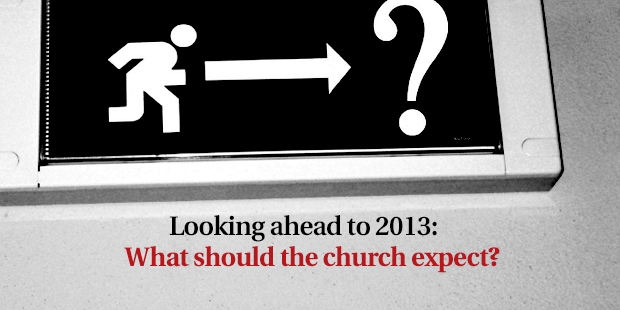
Looking Ahead to 2013: What Should the Church Expect?
If you do not make assumptions about the future, then you are not leading. Good leaders constantly assess the cultural climate. In other words, they do research. Good leaders are also willing to change their assumptions. In other words, they are flexible. Holding firm to assumptions from the Y2K era is about as relevant as giving a set of Pokemon cards to your kids this year for Christmas.
So at the end of every year, I pause to challenge my underlying assumptions of what I believe the future holds. Vision is a key to leadership, and the nature of vision requires an assumption of what will happen in the future. Therefore, you cannot lead unless you are thinking about the future.
In a recent article about Ford Motor Company, the head of their trends and futuring department revealed several assumptions about the coming year. Though Ford is trying to determine consumer demand for automobiles three years in advance, their research is valuable to the church because they are assessing global trends within sociology, economics, technology, and politics, among others.
So what trends should the church expect to help define the cultural climate of 2013? More specifically, what assumptions do people have about organizations right now? The Ford consumer environment report has a lot of commonalities with current church research. I’ve listed below a few general, qualitative assumptions for church leaders to consider.
Lack of organizational trust. The fiscal cliff, BP, News International, bank after bank, public sector or private sector—the list of examples is long. Brand trust, organizational trust, and institutional trust are all low. We’re foolish to think this lack of trust in the culture does not apply to the church. The best way to combat a general lack of organizational trust is to build a specific reputation as a trustworthy church. You may not trust car mechanics—generally—but you probably put forth effort to find one you do trust. And the way you find the trustworthy mechanic is through word-of-mouth. It’s the same with doctors. I recently spent considerable time asking people about the best doctor in a particular field. People may not trust churches organizationally as a whole, but a specific reputation as a trustworthy church spreads rapidly through word-of-mouth.
Desire for accountability in leadership. The single most neglected leadership behavior among executives is… accountability. And it’s the most neglected leadership behavior from a global perspective. It should come as no surprise that people recognize the pervasive culture of unaccountability and desire leaders who not only hold others accountable but are also willing to be held accountable. A lack of leadership accountability precipitates almost every church scandal. People desire accountability. From a biblical perspective, the church should be well-positioned to fill this desire. Ironically, many church leaders avoid it.
Fickle commitment. Gone are the days of working for a company for 50 years. People were once loyal to a single employer. Those employers once went to great lengths to take care of their employees. It just doesn’t happen anymore. Over 90 percent of millennials expect to stay at a job for less than three years. Why would we expect anything different for the church? Many reasons exist as to why people church hop, but a large driving factor is the cultural force of fickleness. A church can build commitment levels by having a culture of high expectations. When these expectations are communicated clearly and upfront, the people that commit are more likely to stick.
Intimacy within the crowd. We are quickly becoming an urban society. Big cities are getting bigger. Big churches are getting bigger. People are leaving the countryside in favor of the concrete jungle. The gravitational pull of large cities and large churches will continue for a generation, at least. But the draw of the city and the large church does not mean people eschew intimacy. In fact, the crowds of megacities and megachurches mean people are more intentional about trying to find intimacy. Healthy churches will get bigger by getting smaller. In this era of urbanization, small group settings are arguably more important now than at any point in our history. Quite simply, you will not keep people in a large worship service for long without also connecting them to a small group.
Weariness of overwhelming amounts of information. Hyperlinks, RSS feeds, and Twitter—all are great until you just get overwhelmed. Access to information is no longer a problem. Everyone is talking, and it’s posted all over the Internet hinterland. Now people just want to know who to listen to. In the overwhelming, loud complexity of our culture, the church should be a solace of simplicity and clarity. Of course, most church leaders try to make their church simple for them. Making a church simple for the people, however, is tremendously difficult and entirely complex for the leadership. As church leaders, we’ve made simple about us. It’s time we make church simple for the people.
Projecting the cultural climate ten years out is about as exact as nailing the tenth day in a ten-day forecast. But there is great value in assessing your assumptions about the direction of the culture, especially within the next year or two. Our culture is constantly changing. What people think about organizations is changing. As a leader, you must become a student of the culture to recognize these changes, and you must be flexible enough to rework your assumptions when necessary.

Tags: Leadership Engine, Planning, Sam Rainer











